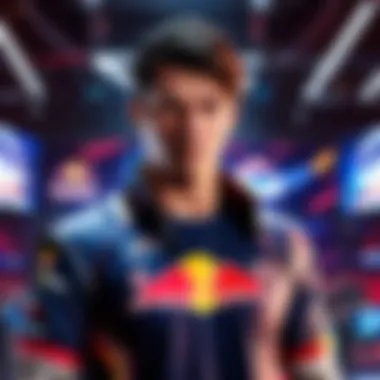Red Bull's Integral Role in Esports Evolution


Game Overview
Intro to Red Bull Esports
Red Bull has significantly influenced the esports landscape. As a global brand, it has aligned itself with competitive gaming through strategic partnerships and sponsorships. This move not only enhances the visibility of the esports scene but also contributes to its overall growth. The company’s involvement aids in professionalizing the industry, allowing players and teams to access vital resources that propel them forward.
The Impact of Sponsorships
One cannot overlook Red Bull's notable sponsorships. The brand collaborates with various esports organizations, providing not only financial support but also marketing expertise. Such partnerships enable teams to thrive in competitive environments. Red Bull's presence in tournaments elevates their profile, attracting more viewers and sponsors, which only benefits the scene as a whole.
"By investing in esports, Red Bull is not just promoting a product but cultivating a culture."
Events and Tournaments
Red Bull has pioneered several esports events that have become crucial to the competitive gaming calendar. Events like the Red Bull Kumite and Red Bull Gaming Sphere offer players unique platforms to showcase their skills. Moreover, they establish an engaging atmosphere for fans, strengthening community ties.
Innovative Marketing Strategies
Marketing in esports requires creativity. Red Bull excels here, utilizing digital platforms and social media to connect with younger audiences. Through visually engaging content and behind-the-scenes access, the brand enhances fan engagement. This approach not only promotes their products but also fosters a sense of belonging within the esports community.
Future Outlook
Looking ahead, Red Bull is poised to maintain a strong influence in the esports industry. The growth trajectories of esports suggest increasing opportunities for brands. Red Bull's continued investment in sponsorships and community engagement will likely position it as a leader in this dynamic environment. As innovations in gaming and technology evolve, their adaptability will play a vital role in shaping the future of esports.
The Evolving Landscape of Esports
The esports industry has transformed rapidly over the past few decades. Once considered a niche activity, competitive gaming has gained mainstream recognition, driven by technology advancements and changing cultural perceptions. This transformation is critical to understanding Red Bull's influence and position within the esports framework.
Historical Context
The journey of esports can be traced back to the early days of arcade gaming and local tournaments. In the late 1970s and 1980s, competitions were modest. However, the 1990s marked the beginning of organized tournaments, such as the Cyberathlete Professional League. The rise of the internet enabled global participation, leading to the birth of professional gaming as we know it today.
Historically, companies like Red Bull emerged in the late 2000s, realizing that esports was not just a passing trend. They recognized the potential for branding and audience engagement. This recognition guided their future involvement and support.
Current Trends in Esports
Today, esports encompasses various genres, including first-person shooters, MOBAs, and sports simulations. Major events can attract millions of viewers online and in-person. The integration of technology provides an immersive experience for fans. This includes live-streaming, viewer analytics, and interactive elements. These trends create new opportunities for sponsors and advertisers.
Moreover, the demographics of esports fans are shifting. A younger audience, primarily aged between 18 to 34, predominantly makes up this community. Companies are adapting their marketing strategies to accommodate this demographic shift. This evolution highlights the significance of understanding the current landscape, as it drives the future directions of the industry.
Red Bull’s Entry into Esports
Red Bull entered the esports realm with a clear strategy focused on brand positioning and community engagement. With sponsorship deals, tournaments, and collaborations, Red Bull tapped into the competitive spirit of gamers. Their early investment in esports teams like Team SoloMid and partnerships with franchises proved their dedication to the scene.
Furthermore, Red Bull's brand becomes synonymous with high-energy competition in gaming. They have shaped not just the gaming culture but also the marketing landscape. Their involvement elevated significant matches and events, including the Red Bull Kumite and Red Bull Rise Till Dawn, showcasing their commitment to fostering competitive spirit.


"The entry of Red Bull and similar brands has been vital in legitimizing esports as a serious industry and a promising avenue for young talent."
As esports continue to grow, understanding Red Bull's role will illuminate not only its business strategies but its impact on competitive gaming's overall trajectory.
Red Bull's Major Sponsorships and Partnerships
Red Bull's influence in esports extends significantly through its major sponsorships and strategic partnerships. This area deserves a detailed examination as it highlights Red Bull's commitment to supporting the esports ecosystem. By collaborating with both professional teams and individual content creators, Red Bull not only enhances its brand visibility but also contributes to the growth of competitive gaming. These relationships create a synergistic effect, benefiting all parties involved while fostering the community.
Professional Teams and Organizations
Red Bull has been instrumental in shaping several professional teams within the esports landscape. By sponsoring teams like Red Bull Racing and others, the brand provides vital financial support and resources that allow teams to operate at their highest level. Sponsored teams benefit not just from monetary support, but also from strategic guidance in marketing and branding, which can be crucial for team visibility.
Moreover, when an esports organization aligns with Red Bull, it often gains an edge in securing additional sponsorships due to Red Bull's reputation. This can lead to better training facilities, enhanced player development programs, and a supportive network within the industry.
Influential Streamers and Content Creators
Partnering with notable streamers and content creators is another key aspect of Red Bull's sponsorship strategy. These partnerships are essential as they connect Red Bull to diverse audiences and potential consumers. Streamers like Ninja and Valkyrae, known for their large followings, can amplify Red Bull's brand message across multiple platforms, from Twitch to YouTube.
Content creators also benefit from these partnerships through access to premium events, exclusive merchandise, and networking opportunities. This relationship propels their career, while improving Red Bull's engagement with fans. It creates a cycle where streamers help to promote events and products, in return for which they gain greater visibility and community support.
Strategic Collaborations with Game Developers
Collaborating with game developers has been a cornerstone of Red Bull's approach to bolstering esports. Aligning with top game companies like Riot Games and Blizzard Entertainment allows Red Bull to integrate its brand into popular games. This results in co-branded tournaments and events that attract large audiences, enriching the competitive scene.
These strategic collaborations also encourage innovation in game mechanics and event formats. When Red Bull is involved, developers often create unique game experiences that can draw more players and fans alike. Furthermore, it aids in enriching the game with content that keeps the audience engaged, paving the way for a more vibrant esports ecosystem.
"Partnerships in esports are not just beneficial, they are essential for growth and sustainability. Red Bull sets a standard that many aspire to reach."
In summary, Red Bull's major sponsorships and partnerships play a crucial role in its strategy within the esports domain. They provide financial backing, enhance visibility, and foster a thriving gaming community. This engagement not only solidifies Red Bull's place within esports but also elevates the competitive scene itself.
Red Bull Esports Events
Red Bull has carved a significant niche for itself within the esports domain through its diverse range of events. The brand's commitment to fostering competitive gaming has resulted in many tournaments and competitions that attract both players and audiences. These events serve as a crucial platform not only for showcasing talent but also for engaging fans and creating a vibrant community around esports. The meticulous planning and execution of these events reflect Red Bull's understanding of the industry's dynamics, ensuring that they remain at the forefront of esports culture.
Signature Tournaments and Competitions
Red Bull’s signature tournaments have become synonymous with high-quality competition. One notable example is the Red Bull Kumite, a fighting game tournament that attracts top-tier players from around the globe. These tournaments provide players significant exposure and allow them to compete at an elite level. Moreover, they contribute to the overall growth of the esports ecosystem by offering substantial prize pools and sponsorship opportunities.
The structure of these competitions typically includes:
- Qualifications: Open rounds where players can qualify to join the main event.
- Main Event: Where the best players face off, often streamed live, enhancing visibility for all participants.
- Finals: Highlighting the top competitors, usually with large audiences both in-person and online.
Event Formats and Structures
Red Bull adapts various formats and structures to keep its events fresh and engaging. Formats can include single elimination, double elimination, or round-robin, depending on the nature of the game and the overall goal of the tournament. For instance, the Red Bull League offers a unique format that allows teams to compete in a league style over an extended period, fostering deeper rivalries and consistent engagement among fans and players alike.


Some key aspects of event structures are:
- Team vs. Individual Competitions: Allowing a range of players, from casual gamers to professional teams, to participate.
- Live Streaming: Integrating various streaming platforms ensures wide reach and accessibility to a global audience.
- Interactive Elements: Engaging audience members through live polls, Q&A sessions, and social media interactions.
Audience Engagement at Events
Audience engagement is one of the hallmarks of Red Bull esports events. The brand effectively combines in-person experiences with digital interactions, ensuring that fans feel involved. From live audience participation to interactive live-streaming features, Red Bull has perfected the art of connecting with fans. This aspect is crucial, as it fosters community building, transforms passive viewers into active participants, and enhances the overall event experience.
Noteworthy components that elevate audience engagement include:
- Social Media Integration: Using platforms like Instagram and Twitter to promote real-time interactions.
- Fan Zones: Creating areas at events where fans can play games and meet their idols.
- Contests and Giveaways: Providing fans with opportunities to win merchandise or exclusive experiences.
Red Bull’s approach not only amplifies viewers’ experiences but also solidifies its position as a leader in the esports industry.
Marketing Strategies in Esports
The concept of marketing strategies in esports is critical to understanding how brands like Red Bull carve out a presence in this dynamic landscape. In the fast-paced world of competitive gaming, effective marketing is not only about visibility, but also building a connection with the target audience. With millions of passionate gamers worldwide, companies must employ specific tactics to resonate with both casual and competitive players.
Marketing strategies in this context should involve carefully crafted campaigns that leverage the gaming culture. For Red Bull, the objective extends beyond mere sponsorship; it aims to create a cultural touchpoint. This is done through various channels such as social media, on-site activations at events, and by integrated content across streaming platforms. By doing so, the brand can enhance its visibility and recognition in a crowded market.
Brand Visibility and Recognition
To achieve brand visibility and recognition, Red Bull invests in high-profile sponsorships with esports teams and events. Visibility is crucial as it makes the brand synonymous with esports activities. This is often seen where Red Bull is prominent at major tournaments like ESL One and League of Legends Championship Series. Such partnerships not only improve recognition but also reinforce the brand's alignment with the gaming community.
Key factors to consider include:
- Consistent Presence: Regular participation in various esports activities keeps the brand at the forefront of gamers’ minds.
- Effective Collaborations: Partnering with reputable teams and streamers expands the brand's reach and credibility.
- Cross-Promotion: Utilizing multiple platforms for marketing creates a holistic approach, fostering a deeper connection with the audience.
Engagement with Esports Communities
Engaging with esports communities forms a backbone for Red Bull's strategy. Needing to connect authentically with gamers, Red Bull hosts a variety of events and promotions that cater to these communities. By doing so, the brand is seen as more than just a sponsor; it becomes an integral part of the gaming culture.
This engagement can manifest in different ways, such as:
- Local Tournaments: Organizing grassroots competitions allows the brand to tap into local gaming scenes.
- Interactive Content: Creating content that encourages interaction, like challenges on streaming platforms, bolsters community connection.
- Grassroots Support: Supporting smaller teams and amateur players fosters loyalty and appreciation among the gaming community.
Innovative Digital Marketing Approaches
The digital landscape is continuously evolving, and Red Bull has adopted innovative digital marketing approaches that resonate well with esports audiences. From influencer partnerships to engaging social media campaigns, these strategies not only push brand visibility but also create a more engaging fan experience.
Elements of Red Bull's digital marketing approaches include:
- Influencer Campaigns: Collaborating with popular streamers for brand endorsements taps into their follower base for greater reach.
- Engaging Visual Content: Utilizing eye-catching visuals for promotions that are suited for platforms like Instagram and Twitch.
- Interactive Campaigns: Running contests and challenges that encourage fan participation enhances the community feel.
"Effective marketing in esports is about creating authentic connections rather than simply promoting a product."


Through these strategies, Red Bull ensures it remains relevant in the rapidly evolving esports environment, effectively bridging the gap between the gaming culture and the brand itself.
The Impact of Red Bull on Player Development
The role of Red Bull in player development within the esports arena is crucial. It not only enhances the skills and potential of competitive gamers but also significantly shapes the future of the industry as a whole. Red Bull has established itself as a strong supporter of atletas through various initiatives, providing necessary resources and a platform for growth. This section explores key aspects that demonstrate Red Bull's lasting impact on player development.
Training Facilities and Resources
Red Bull has invested heavily in state-of-the-art training facilities tailored specifically for esports athletes. These facilities often include high-speed internet connections, advanced gaming setups, and comfortable environments conducive to practice and development. Having access to these resources enables players to hone their skills effectively.
Additionally, Red Bull creates spaces where players can engage with coaches and analysts. The presence of technical support and performance experts elevates the quality of training. Regular workshops and skill assessments are also held to measure progress and refine individual strategies, ensuring that athletes stay competitive in the fast-paced world of gaming.
Sponsoring Up-and-Coming Talent
Identifying and nurturing promising talent is one of Red Bull's key strategies in player development. The company has forged partnerships with emerging players and organizations, offering sponsorship deals that bring financial support and visibility. This type of pipeline not only benefits the players but also enriches the esports community as a whole.
New talent can gain access to elite competitions that would otherwise be out of reach. By showcasing their skills on larger platforms, sponsored players have a better chance of being noticed by scouts or bigger teams. Red Bull's commitment to helping young players flourish is evident through its ongoing dedication to developing the next generation of esports talent.
Mentorship Programs and Initiatives
Red Bull recognizes the importance of mentorship in guiding players through their competitive journeys. By establishing mentorship programs, the company connects seasoned pros with novice players. This creates a system where knowledge transfer occurs, allowing newcomers to learn from the experiences of established figures in the industry.
Such initiatives often include one-on-one coaching sessions, strategy discussions, and even joint practice sessions. Players receive personalized feedback, which serves to accelerate their growth and enrich their understanding of the game.
Furthermore, these mentorship programs foster a sense of community. It encourages players to cultivate relationships and networks within the esports ecosystem, vital for their professional lives. As Red Bull continues to innovate and support player development, the impact on the future landscape of esports becomes clearer, benefiting everyone involved.
The Broader Implications of Red Bull in Esports
The influence of Red Bull in the esports ecosystem extends beyond mere sponsorships and event organization. Its positioning has reshaped various facets of the industry, creating a multifaceted impact that merits closer examination. Understanding these broader implications allows for a deeper appreciation of how gaming, culture, and commerce intertwine.
Cultural Influence on Gaming
Red Bull has positioned itself as more than just an energy drink brand. It has become a cultural icon within the gaming community. By sponsoring significant events and teams, Red Bull has changed the narratives around gaming. The brand has helped legitimize esports in the eyes of mainstream audiences. This validation fosters acceptance and admiration for competitive gaming.
The sponsorship of popular tournaments creates a shared experience for fans. It generates community engagement and excitement within the gaming culture. The brand’s presence at events, like the Red Bull Kumite, offers gamers not just a competition, but a chance to engage with a larger community. Additionally, Red Bull promotes gaming-related content across various media platforms. This includes documentaries and series featuring notable players. These endeavors contribute to a richer understanding of the struggles and triumphs faced by these players, bridging the gap between casual fans and professional gamers.
Financial Growth and Sustainability
The partnership with Red Bull triggers financial growth within the esports landscape. The support from a global brand elevates the profile of esports titles and attracts more investments. The sponsorships epitomize how established brands can bolster emerging markets. They deliver resources necessary for development. This includes funding for teams and tournaments which, in turn, generates more visibility for esports.
Moreover, Red Bull's involvement promotes sustainability for organizations. Esports teams benefit from consistent financial backing which aids longevity. Financial stability empowers teams to focus on player development rather than merely surviving in an economically volatile market.
According to various analyses, sectors that receive proper investments tend to grow. The influx of cash flows from Red Bull and similar entities has an exponential effect on the overall industry health.
Future Trends and Developments
As the esports landscape evolves, Red Bull remains a significant catalyst for change. Observing trends in gaming culture and consumer preferences can provide insight into what is next. Red Bull is already investing in novel areas like virtual reality gaming. This investment suggests an intention to remain at the forefront of technological advancement in the industry.
The rise of mobile gaming also presents opportunities. Red Bull has the capacity to adapt and explore sponsorships in developing mobile esports scenes. This shift can influence how gamers interact with brands, as many casual gamers are now moving towards mobile platforms.
Furthermore, gaming regulations around the globe are changing. Red Bull’s established presence can help navigate these changes, setting a precedent for other brands in the sector.

